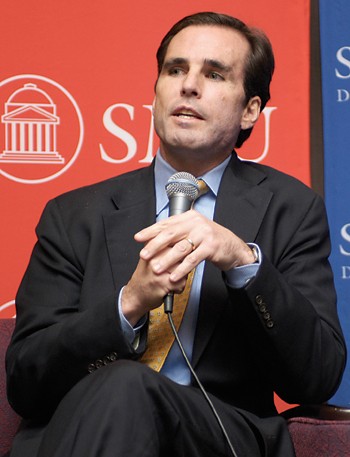
ABC news correspondent Bob Woodruff speaks to students at the Tate Student Forum yesterday afternoon in the Hughes-Trigg Student Center. (Lindsey Perkins)
“Scars are not forever” was the message that Bob and Lee Woodruff conveyed to the captivated audience consisting of community members, and a mix of high school and SMU students and faculty on Tuesday at the Willis M. Tate Distinguished Lecture Series.
Woodruff is a reporter for ABC News, and while on assignment in Iraq in January 2006, a roadside bomb exploded near his convoy, from which he suffered a severe head trauma and required major reconstructive surgery.
Since emerging from his 36-day coma, Woodruff has had to relearn everything, including the English language. Bob and wife Lee published a book on their experience entitled “In an Instant: A Family’s Journey of Love and Healing.” The couple quoted the book and shared their experiences of trying to recover from this tragedy.
“If you can’t use humor in this situation, you would probably start crying and have a hard time stopping,” Woodruff said, referring to the humor that the couple infused in their book to “give hope and joy to readers facing similar circumstances.”
The couple said their main reason for writing the book at first was as a recovery agent. To help them get through the troubled time, they turned to what they know best: writing.
“In all honesty, it didn’t start off as a book, but as a journal to keep my thoughts, and then later adding Bob in to help him regain his writing and language abilities,” Lee said.
The couple spoke on their writing turning into a book after they had recovered from their emotional wounds, as a way to tell the story of “the thousands of service men coming back with brain injuries that no one knows their story,” Bob said.
In addition to using Bob’s story to tell those of countless brave American soldiers, the couple also wanted children to take away life lessons from this terrible experience.
“[The book] lets kids see that there is no knight in shining armor, life is work, life is the unexpected, and it is how you rise up to meet those challenges that defines you as people,” Lee said.
Two years after his injury, Woodruff is still recovering. Both Bob and Lee laughed and made jokes at the expense of Bob’s recovery process, citing many instances in which he had inserted a wrong word in a situation while still trying to fully recover his language ability.
Bob may still be recovering, but this has not stopped him from returning to his former life as a international journalist. He spoke about places he had recently visited, and when asked if he had any anxiety about going to dangerous places in pursuit of stories, he responded with, “You can step off a curb in Manhattan and get hit by a bus; you have to keep going, you have to live life.”
Bob’s interest in journalism on the international level has not changed, but he spoke of a new interest in interviewing those who had experiences similar to his own in the war. He cited one interview with the help of his wife that “moved him to tears,” going on to say that “the real miracles are when people are able to move on with their lives, to recover and live life again.”
Bob and Lee themed the lecture and forum on the idea that horrific events such as these are not the end. “It is possible to recover and move on, and live and love life again,” Woodruff said.
He went on to speak of a time when he was following up with a soldier he had interviewed with a case similar to his: “I went to e-mail him and noticed the first part of his address was ‘scars are not forever’ and I thought to myself, it’s so true.”








